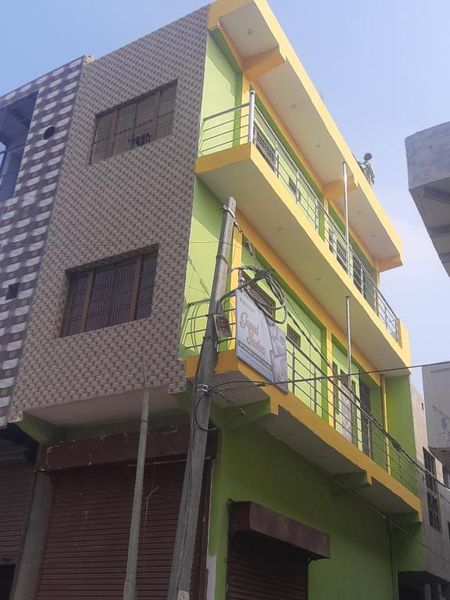Indonesia Visa for British Citizens - eVisa Indonesia
 Arthur Rousseau
01 Nov, 2025
26 mins read
10
Arthur Rousseau
01 Nov, 2025
26 mins read
10
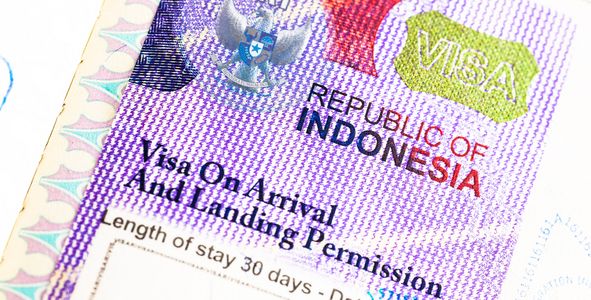
So, you've booked your trip from the UK to Bali. You're dreaming of the rice terraces in Ubud, the beaches of Uluwatu, and the volcanoes of Lombok. But now you're facing the one thing that isn't relaxing: the visa. You've heard about an "e-Visa," a "Visa on Arrival," long queues, and a new tourist tax.
We're going to give you the exact, genuine plan to get you from your plane to your hotel with zero stress.
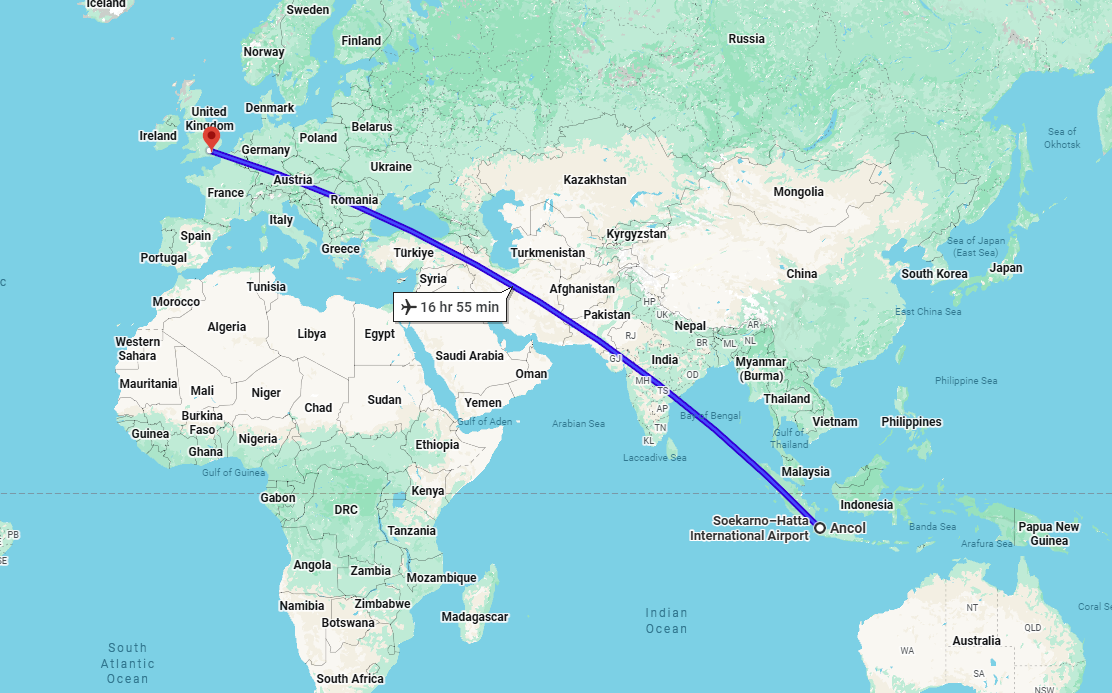
So, Do UK Citizens Need a Visa for Indonesia?
Yes. Let's be 100% clear on this: UK citizens (holding a 'British citizen' passport) must have a visa to enter Indonesia.
The days of visa-free travel for UK passports are not currently in effect. You cannot just show up and walk through immigration. You need a visa.
But here's where the confusion starts. You have two main options for your 30-day tourist trip:
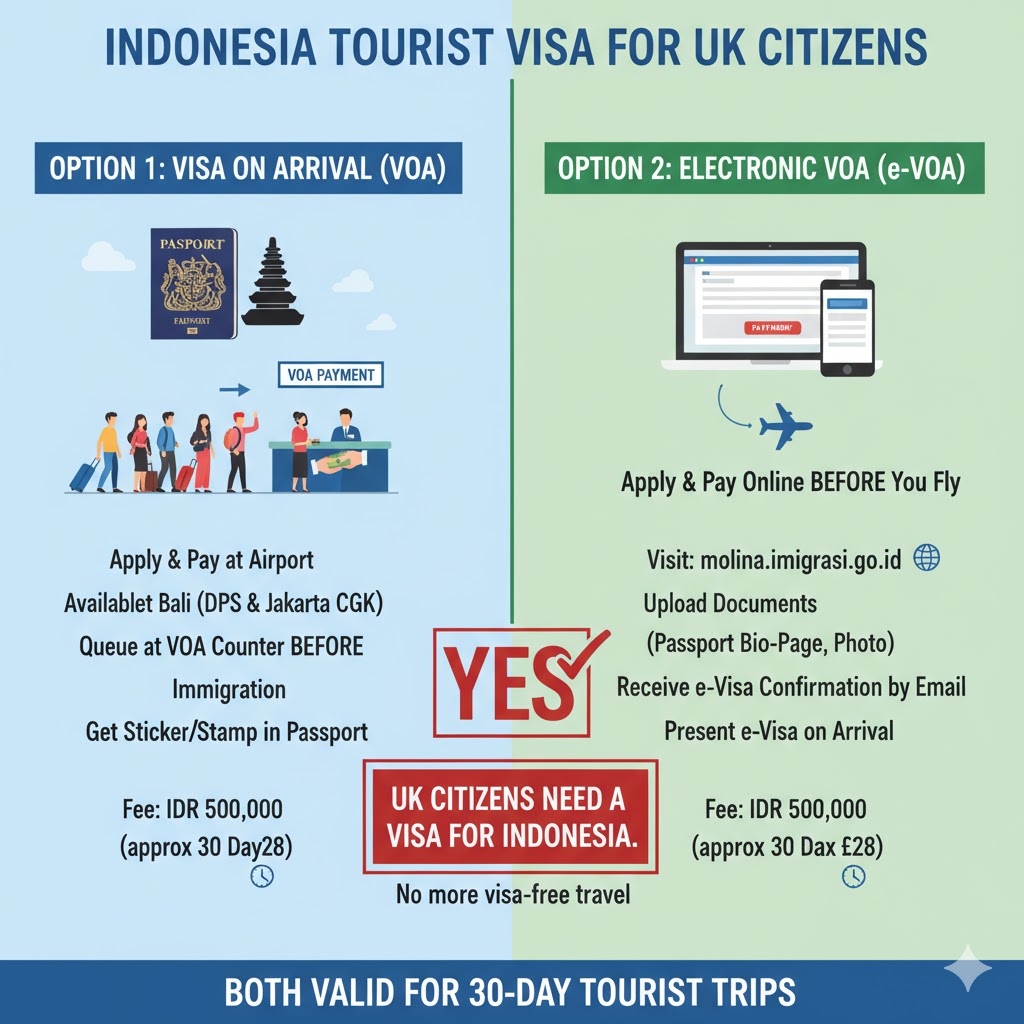
- Visa on Arrival (VOA): You can get this at the airport when you land in Bali (DPS) or Jakarta (CGK). You queue at a specific "VOA" counter before immigration to pay the fee and get a sticker/stamp.
- Electronic Visa on Arrival (e-VOA): This is the "e-Visa" you've heard about. It's the exact same visa as the VOA, but you apply for Indonesia e-Visa Application and pay for it online before you fly.
This guide will focus on the e-VOA, as it's the key to a much smoother arrival.
What's the Difference: Indonesia e-Visa (Online) vs. VOA (at the Airport)?
This is the most common question, and the answer is simple: queues and peace of mind.
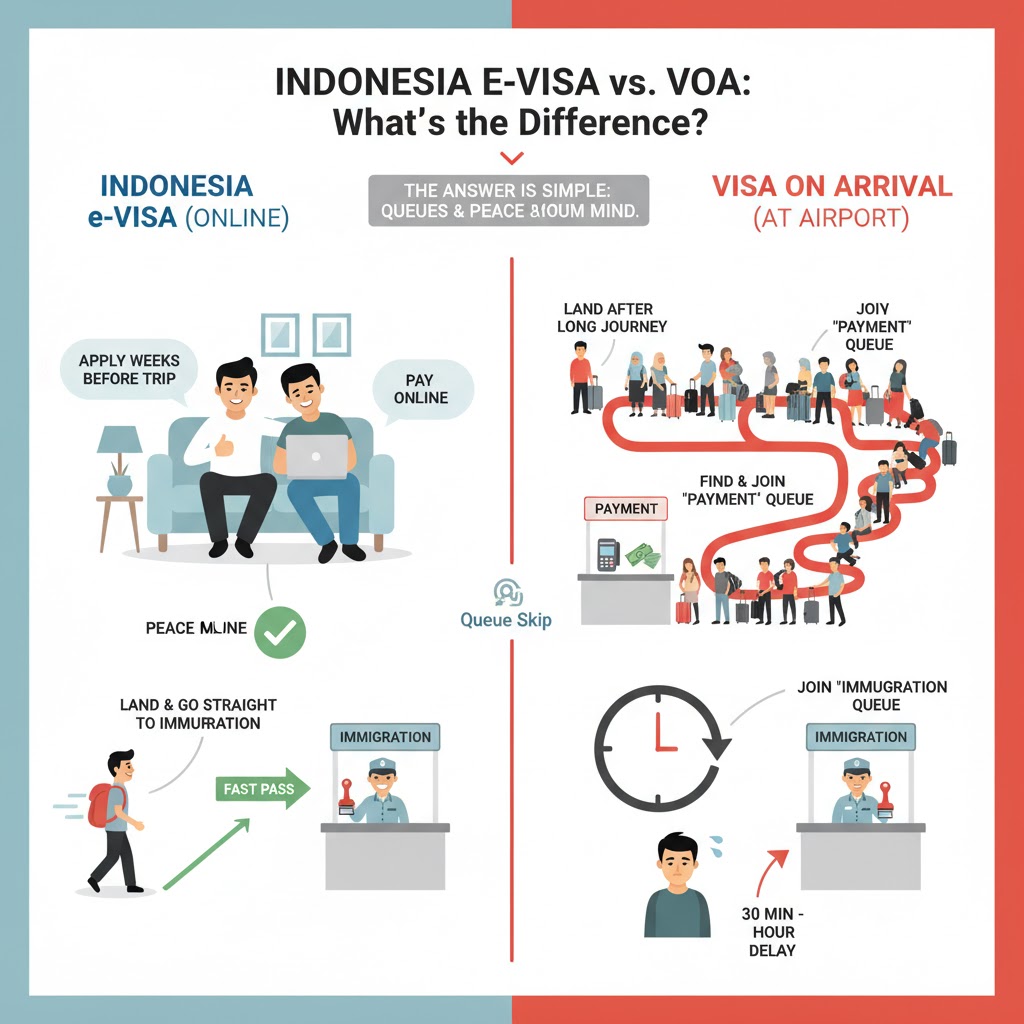
- Getting the VOA (at the airport): You land after a 17+ hour journey. You walk to a massive hall. You first have to find and line up at the "VOA Payment" queue. You pay your fee (by card or cash). Then, you take your receipt and join the second (and much longer) "Immigration" queue.
- Getting the e-VOA (online): You apply and pay at home, weeks before your trip. You land. You skip the VOA Payment queue entirely and go straight to the main "Immigration" queue.
The e-VOA is your "fast pass" to skip that first queue, saving you anywhere from 30 minutes to an hour of standing in line when you're tired and just want to get to your hotel.
How Do I Apply for Indonesia e-Visa?
The process is refreshingly straightforward.
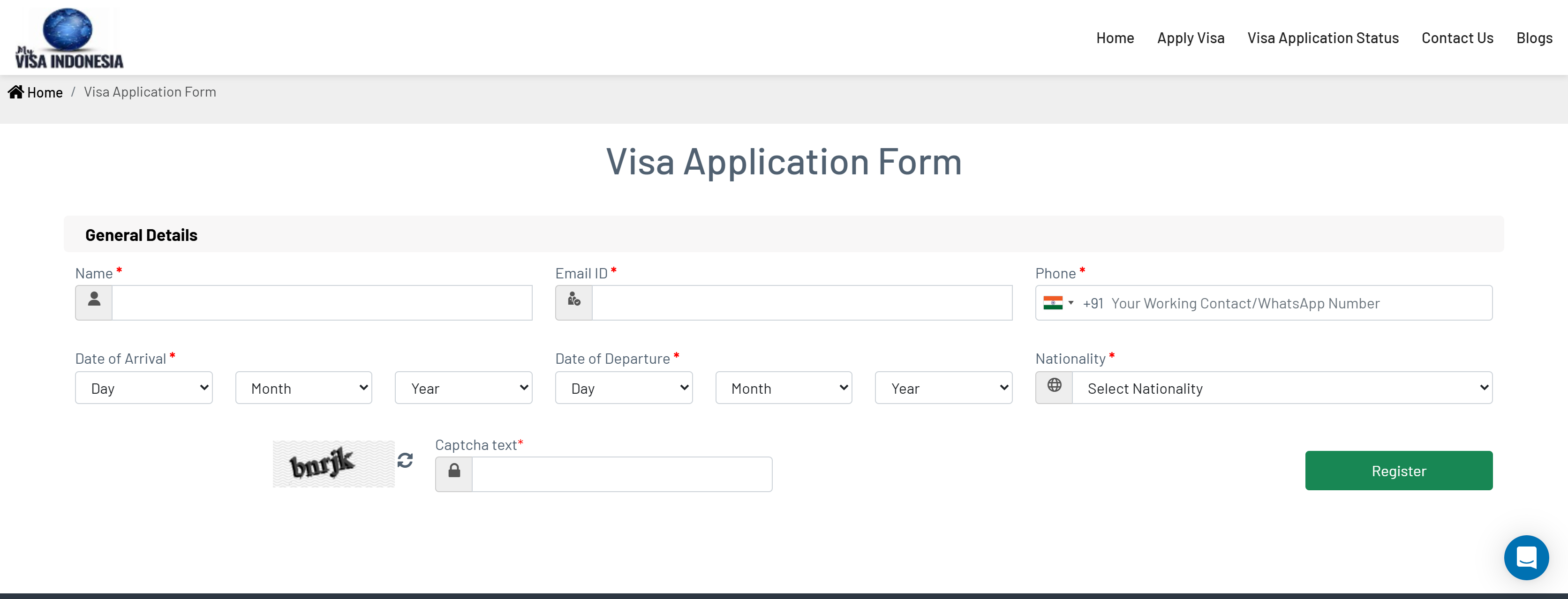
- Start Your Application: Log in and select "Apply Indonesia eVisa for UK Citizens." You will be applying for the e-VOA.
- Fill in the Details: You'll need to enter your personal information, passport details, flight number, and the address where you're staying in Indonesia (your first hotel is fine).
- Upload Your Documents: The system will ask for your uploads. (See the next section for what you need).
- Pay the Fee: You'll be directed to a payment gateway. Pay the visa fee , Mastercard, or JCB. Practical Tip: Make sure your UK bank card is enabled for international (and 3D-Secure) transactions, or it might be declined.
- Download Your e-VOA: Once approved (this is often very fast), your e-VOA will be available to download from the portal and will also be sent to your email. It will be a PDF with a QR code. Save it to your phone and print a hard copy as a backup.
What Documents Do I Need for the Indonesia e-Visa Application?
It's surprisingly minimal. All you need to upload is:
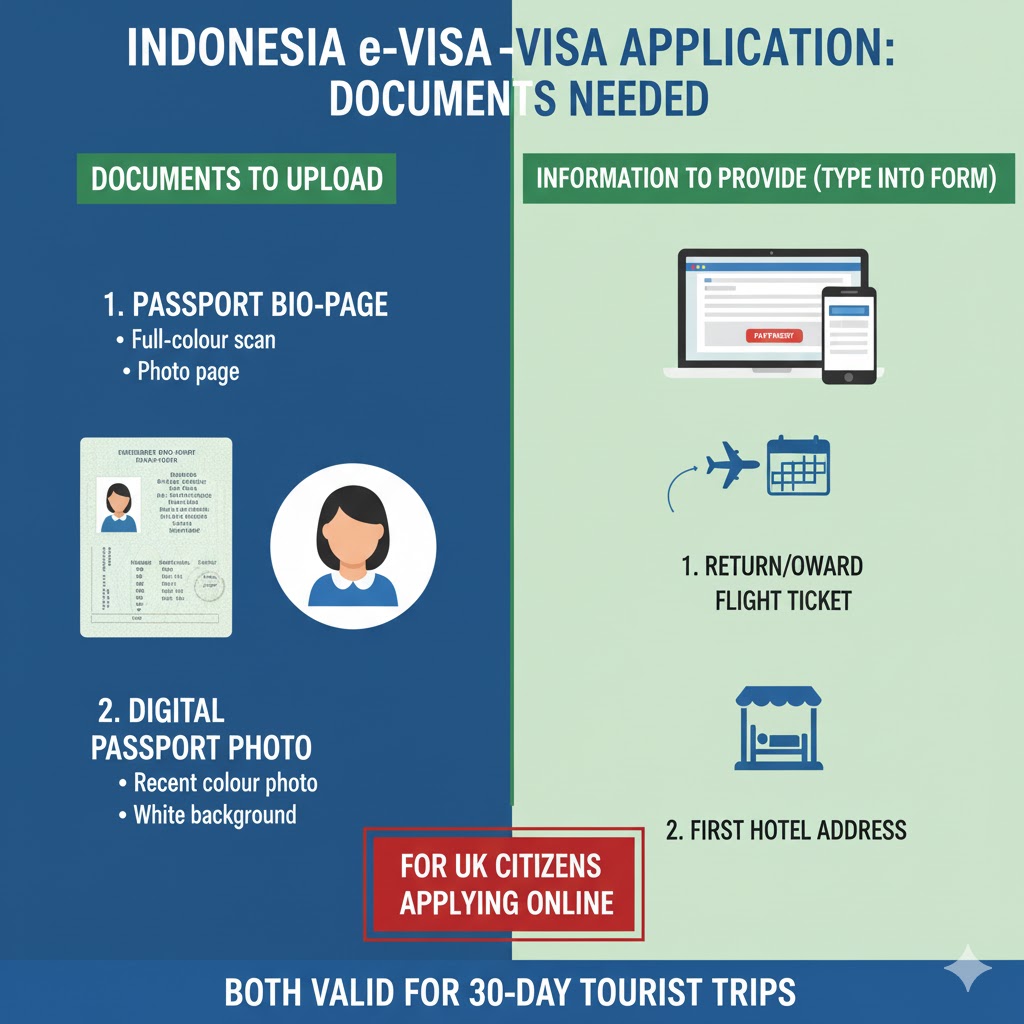
- Your Passport Bio-Page: A clear, full-colour scan of the photo page of your UK passport.
- A Digital Passport Photo: A recent, colour photo of yourself, white background.
You will also need (but not to upload) your return/onward flight ticket and your first hotel address to type into the form.
What Happens if My Indonesia e-Visa Application is Denied?
This is a rare event for UK citizens, but it can happen, usually due to a simple error. A denial is not a permanent ban.
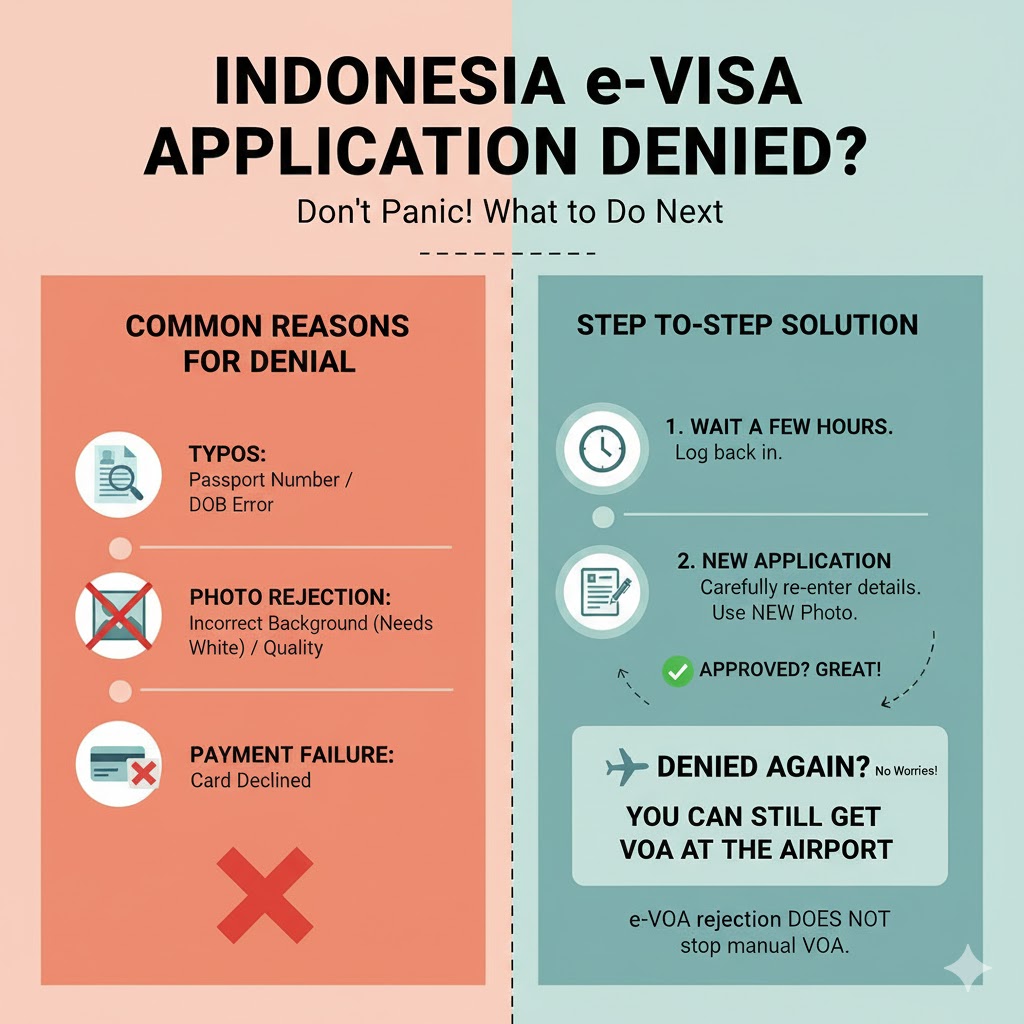
- Check for Typos: The most common reason is a typo in your passport number or date of birth.
- Photo Rejection: Your passport photo didn't meet the standards (e.g., not a white background).
- Payment Failure: Your payment was declined, which can sometimes look like a rejection.
What to do: Don't panic. You cannot "appeal" the decision. Simply wait a few hours, log back in, and start a brand new application. Carefully re-enter all your details and use a clear, new photo.
If it's denied a second time, don't worry. You can still fly to Bali and simply get the standard Visa on Arrival (VOA) at the airport. The e-VOA rejection does not stop you from getting the manual VOA when you land.
What if I Want to Stay Longer Than 30 Days? (The 60-day e-Visa)
This is a very common question. The 30-day e-VOA is extendable once for another 30 days (total 60 days).
However, if you know from the start you want to stay 5-8 weeks, you can get a 60-day e-Visa (index 211A) instead.
- Cost: It's more expensive, typically IDR 1,500,000 (about £75 GBP).
- Documents: It may require more documents, such as a recent bank statement.
- Benefit: You get 60 days from the moment you land, with no need to visit an immigration office to get an extension. This is the "peace of mind" option for longer trips.
How Do I Extend My 30-day e-VOA in Indonesia?
So, you're in Bali, you love it, and you want to stay for your full 60 days. You must extend your 30-day e-VOA.
You have two options:
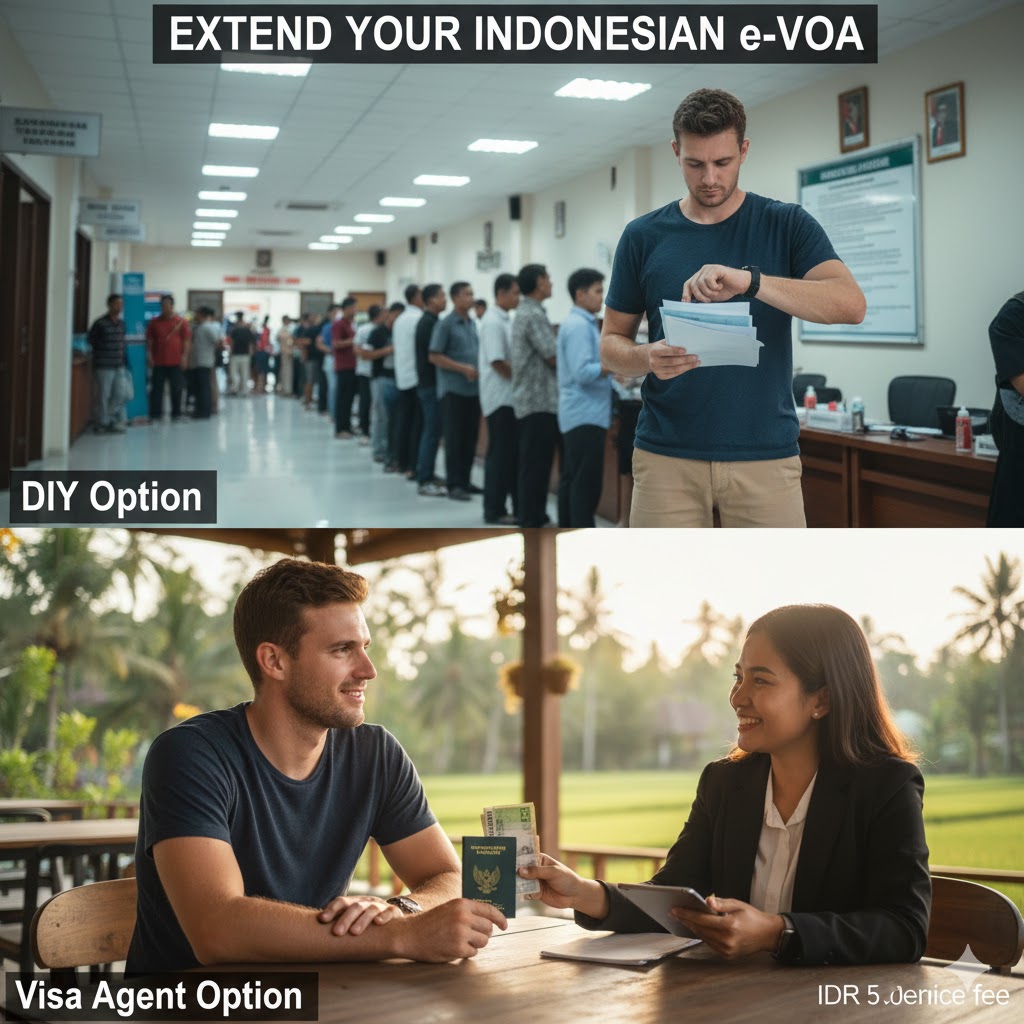
- The DIY Option: You must go to an immigration office (Imigrasi) in Indonesia (e.g., in Jimbaran or Denpasar) at least 7-10 working days before your 30 days are up. It requires multiple visits: one to submit your passport and forms, and another a few days later for a photo, fingerprints, and payment. It's cheap but can take a lot of your holiday time.
- The Visa Agent Option: This is what 99% of people do. You find a reputable visa agent in Bali (ask your hotel or co-working space for a recommendation). You give them your passport and the fee (the official IDR 500,000 + their service fee), and they do all the running around for you. You will only have to show up once at the immigration office for your photo and fingerprints.
What is the Penalty for Overstaying My Visa in Indonesia?
Do not do this. Indonesian immigration does not play around.
The penalty for overstaying is IDR 1,000,000 (about £50 GBP) per day.
This is not a "maybe"; it's an automatic fine you must pay at the airport when you try to leave. If you overstay by a few days, you'll be taken to an office, you'll pay the fine, and you might miss your flight. If you overstay by a significant amount (over 60 days), you risk detention and deportation. It's not worth the stress.
What is the Other Fee? (The IDR 150,000 Bali Tourist Tax)
This is a new and separate fee that confuses many travelers.
As of 2024, all foreign tourists entering Bali (not other parts of Indonesia, just Bali) must pay a one-time Bali Tourist Levy of IDR 150,000 (about £7.50 GBP).
This is NOT your visa fee. It's a separate tourism tax.
You are highly encouraged to pay this online before your trip.
Paying this in advance saves you another queue at the airport. You'll get a QR code voucher sent to your email.
I Got My e-VOA! What's the "Secret Second Step" I Must Do Before Flying?
This is the part that almost everyone forgets. Getting your visa is Step 1. But to actually enter the country, you must complete the Electronic Customs Declaration (e-CD).
This is a mandatory digital form for all travelers (including Indonesian citizens) that replaces that old paper customs card they used to hand out on the plane.
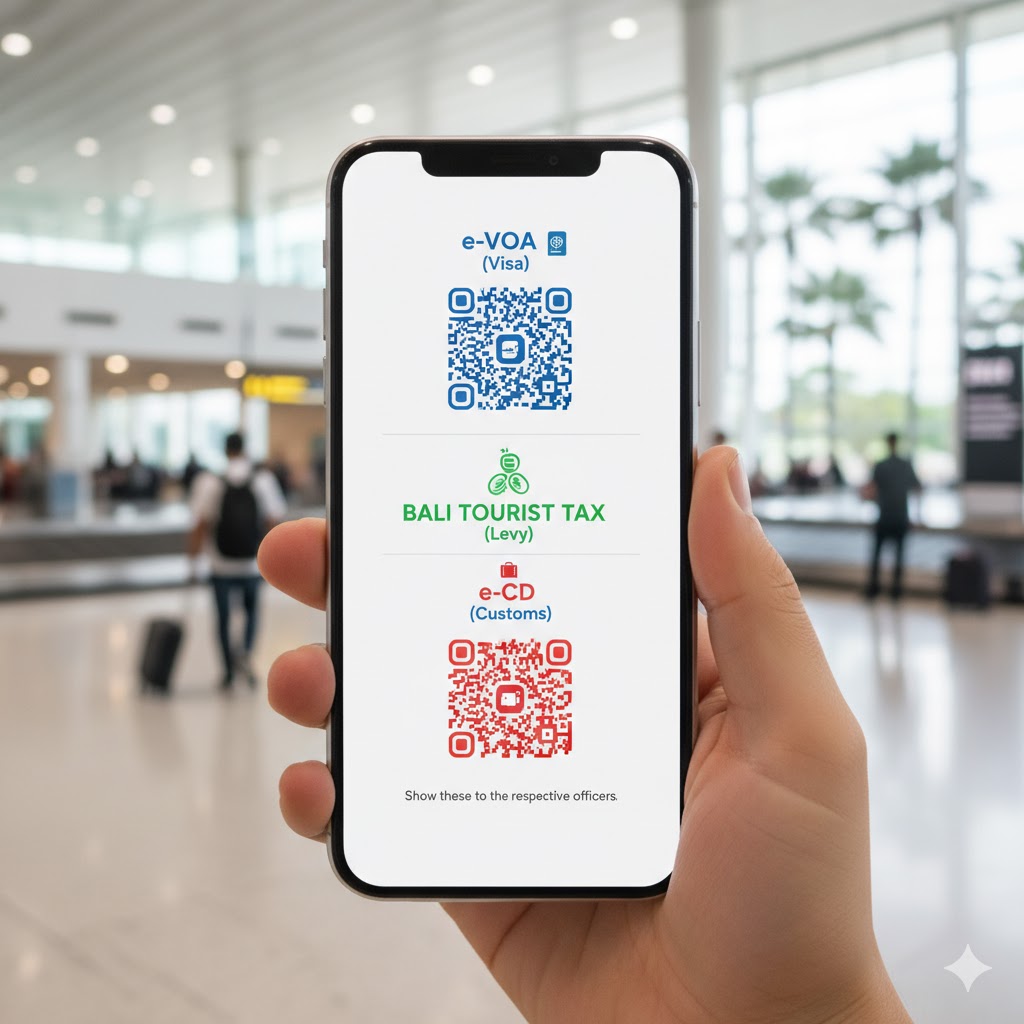
When to fill it out: You can only fill this out within 72 hours (3 days) of your arrival time.
It's completely free.
You fill out the form (your details, flight, what you're bringing in), and at the end, it generates a big QR code. Screenshot this or save it to your phone. You will show this to a customs officer after you have collected all your luggage.
Your Arrival Checklist (The 3 QR Codes):
- e-VOA (Visa): To show the immigration officer.
- Bali Tourist Tax (Levy): To show the official at the tax counter.
- e-CD (Customs): To show the customs officer just before you exit.
What Vaccinations Do UK Travellers Need for Bali?
For most UK tourists, the answer is simple.
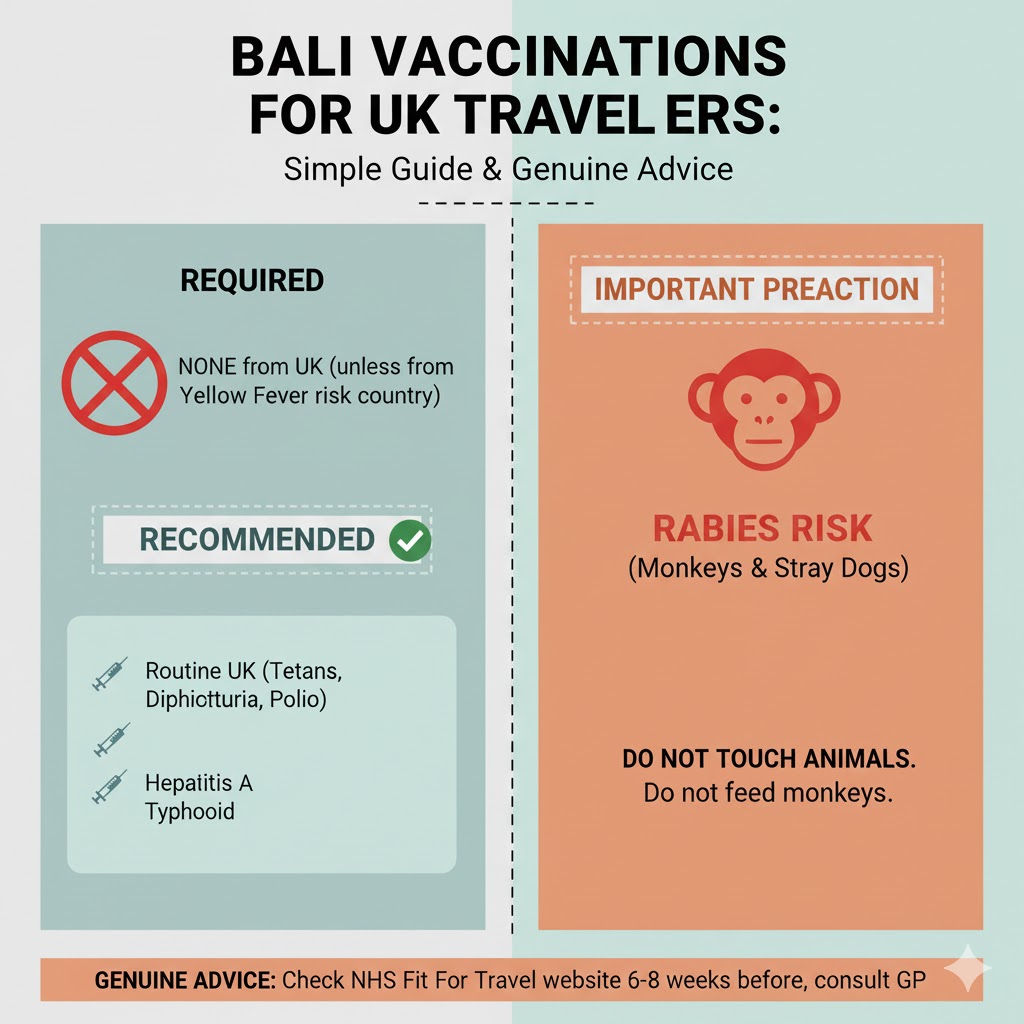
- Required: No vaccinations are required for entry from the UK, unless you are travelling from a country with a risk of Yellow Fever.
- Recommended: The NHS Fit for Travel website recommends that most travellers should be up-to-date with routine UK vaccinations (like Tetanus, Diphtheria, Polio). They also often recommend Hepatitis A and Typhoid as a precaution, as these can be spread through contaminated food or water.
- Rabies: This is a risk in Bali (mainly from monkeys and stray dogs). The pre-exposure jab is expensive, so the best advice is to not touch the animals. Do not feed the monkeys at the Monkey Forest.
Genuine Advice: Check the NHS Fit for Travel website 6-8 weeks before you fly and discuss with your GP.
Is My UK Passport Damaged? (A Genuine Warning That Could Get You Denied Entry)
This is not a joke. Indonesian immigration authorities are famously the strictest in the world about passport conditions.
We are not talking about a ripped-in-half passport. We're talking about:
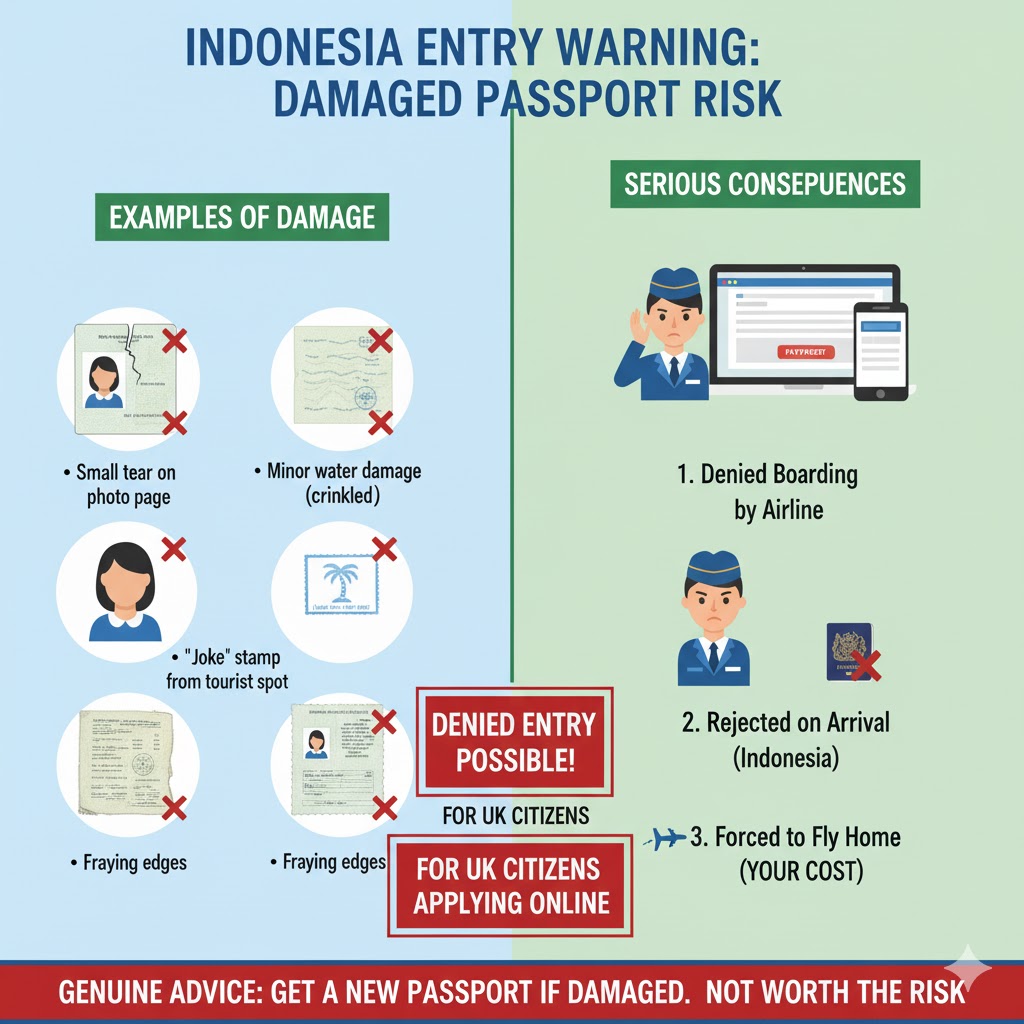
- A small tear on the photo page.
- Minor water damage (a crinkled page).
- A 'joke' stamp from a tourist spot.
- Fraying edges.
Airlines in the UK will check your passport at check-in, and if they think it's even slightly damaged, they may deny you boarding because they know you'll be rejected on arrival and they'll have to pay to fly you back.
Genuine Advice: If your passport has any damage at all, even if you think it's "fine," get a new one before you fly to Indonesia. It's not worth the risk.
What Are the Real Problems First-Timers Face at Bali (DPS) Airport?
You've got your 3 QR codes, and your passport is perfect. Here's the final part of the plan.
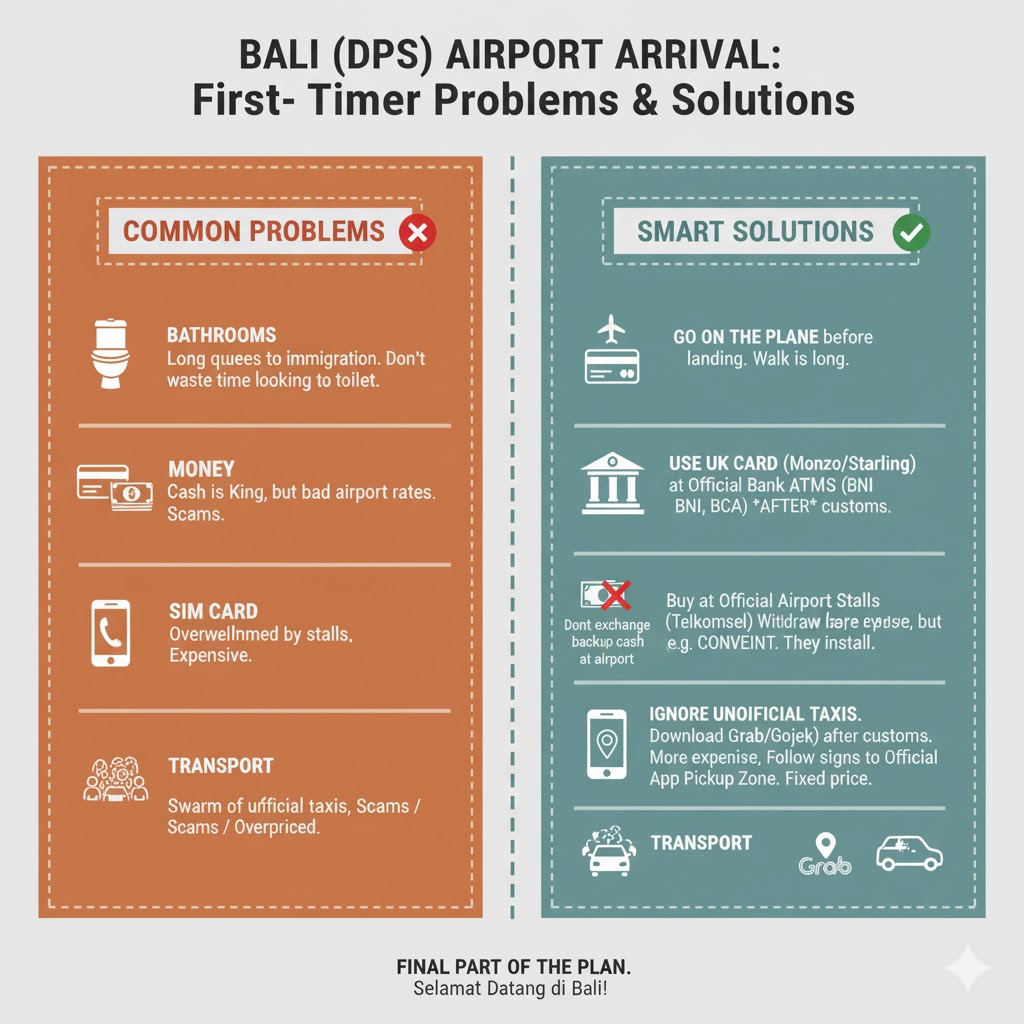
- The Bathroom: Go to the toilet on the plane before you land. The walk from the gate to immigration is long, and the queues can be 1-2 hours. Don't waste time looking for a toilet in the arrivals hall.
- Money: Can I Use My UK (Monzo/Starling) Card or Should I Bring Cash? This is the ultimate money plan. Do both.
- Your UK Card: Your Monzo, Starling, or Chase card is perfect. They give you the best exchange rate. Use it at the official bank ATMs (BNI, Mandiri, BCA) inside the arrivals hall (after customs) to withdraw a large amount of cash (e.g., 2,000,000 IDR). This is the cheapest way to get cash.
- Your Backup Cash: Bring £100-£200 in clean, new GBP or USD notes as an emergency backup. Do NOT exchange this at the airport. If you need to exchange it, do it at a "Central Kuta" or "BMC" money changer outside the airport; they are reputable.
- The Rule: Cash is king in Bali. You will use it for small warungs (local cafes), drivers, and market stalls. Use your card for larger hotels and restaurants.
- SIM Cards: You'll see stalls for Telkomsel and other providers after customs. They are a bit more expensive than buying in town, but the convenience is worth it. They will install and activate the SIM for you.
- Transport (Avoiding Scams): As you exit, you will be swarmed by unofficial taxi drivers shouting "Transport! Taxi! Where you go?" This is overwhelming. Ignore them all.
- The Best Way: Use the Grab or Gojek apps (Indonesia's Uber). There is an official, designated pickup zone for these apps. Follow the signs, book your ride on the app, and you'll get a fair, fixed price.
So, is the e-VOA Really Better Than Just Getting it at the Airport?
100% yes. For the cost of £25 and 10 minutes of your time online, you buy yourself peace of mind, you skip the first (and most chaotic) queue, and you prove to the immigration officer that you're a prepared and genuine tourist. It's the single best "travel hack" for a smooth start to your holiday.
Written By:
Arthur Rousseau



Hotels at your convenience
Now choose your stay according to your preference. From finding a place for your dream destination or a mere weekend getaway to business accommodations or brief stay, we have got you covered. Explore hotels as per your mood.

